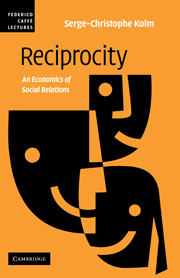Book contents
- Frontmatter
- Contents
- List of illustrations
- Foreword
- Introduction
- Part I Facts and forms
- Part II Motives
- Part III Values and reasons
- Part IV The economics of reciprocity
- 17 General methodology of reciprocity analysis
- 18 The theory of comparative, matching, or balance reciprocity
- 19 The theory of liking reciprocity
- 20 Strategic interaction and process preferences: games of reciprocity
- 21 General properties of processes
- 22 Solutions of reciprocity games; comparisons
- 23 Reciprocity in the understanding of society and its economy
- Bibliography
- Index
22 - Solutions of reciprocity games; comparisons
Published online by Cambridge University Press: 22 September 2009
- Frontmatter
- Contents
- List of illustrations
- Foreword
- Introduction
- Part I Facts and forms
- Part II Motives
- Part III Values and reasons
- Part IV The economics of reciprocity
- 17 General methodology of reciprocity analysis
- 18 The theory of comparative, matching, or balance reciprocity
- 19 The theory of liking reciprocity
- 20 Strategic interaction and process preferences: games of reciprocity
- 21 General properties of processes
- 22 Solutions of reciprocity games; comparisons
- 23 Reciprocity in the understanding of society and its economy
- Bibliography
- Index
Summary
The three solution concepts
Setting
In reciprocities, the transfers are gifts. In the simple gift/ return-gift processes, there are two agents, and agent i hands out gift xi to agent j who reciprocates with the return gift xj to agent i. The xi and xj can a priori be of any nature, but we will consider later the “quantitative case” in which each gift is a quantity of a good. A notable issue is that of gift refusal, the possibility of refusing a gift in totality or in part, and its consequences. This can apply to the initial gift, to the return gift, or to both. The issue of gift refusal is disregarded in this section for simplicity and because, in a number of cases, it does not matter, or does not occur, or even cannot occur. (It may be that the agents do not refuse because they appreciate the other's gift, or only the gifts offered matter, or refusing the gift or returning it back may not be possible for a material reason or because of a norm internalized or imposed by social pressure, or the giver may be able to refuse the refusal – for instance in not “taking back” something refused –, and so on).
- Type
- Chapter
- Information
- ReciprocityAn Economics of Social Relations, pp. 298 - 317Publisher: Cambridge University PressPrint publication year: 2008

